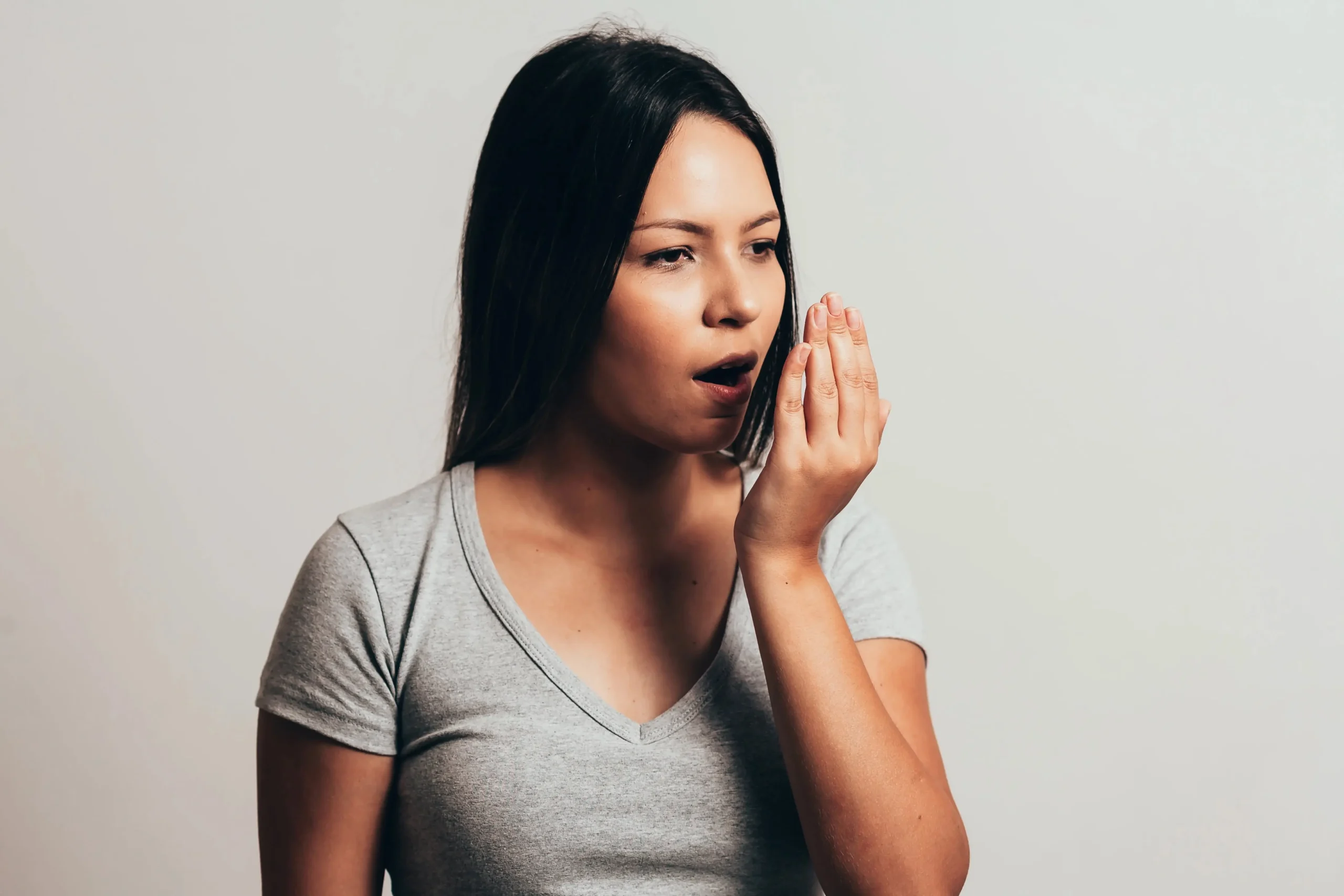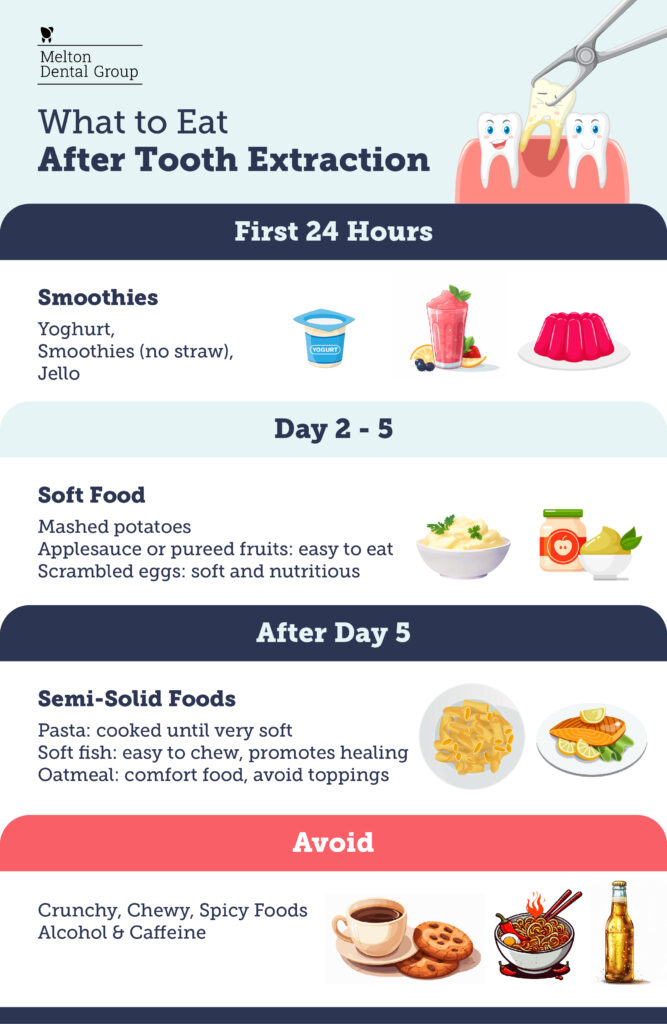Bad Breath After Tooth Extraction: Causes & Treatments | Melton Dental Group
October 31, 2024

Are you experiencing bad breath after a tooth extraction? Don’t worry; you’re not alone.
Tooth extractions are often necessary for maintaining your oral health. However, if not cared for properly afterwards, they can lead to bad breath. If you have recently had a tooth extraction and are experiencing bad breath, you are not alone. Bad breath after a tooth extraction is common, but it is usually manageable with proper post-care.
In this article, we will explore the possible causes of bad breath after extraction and give you suggestions on how to regain fresh breath! If you are worried about persistent bad breath, contact our experienced team at Melton Dental Group. We are here to help identify and address the problem.
What Causes Bad Breath After Tooth Extraction
1. Poor Oral Hygiene
One of the most common causes of bad breath after a tooth extraction is poor oral hygiene. After an extraction, you might be reluctant to brush or floss around the area due to discomfort, which can result in a buildup of food particles and bacteria. When bacteria collects in your mouth and on your gums, they produce foul-smelling gases, which contribute towards bad breath.
It’s important to maintain good oral hygiene, even after an extraction. Brush gently around the extraction site and use a soft bristled toothbrush to prevent irritation. If bad breath persists, visit your dentist in Melton to ensure that there are no underlying issues.
2. Bacterial Infections
A bacterial infection may develop after tooth extraction, particularly if the site isn’t properly cared for. Infections can cause symptoms like swelling, redness, pain and foul-smelling discharge, which leads to bad breath.
To reduce the risk of infection, follow your dentist’s aftercare instructions closely. This typically includes avoiding smoking, alcohol and the use of straws for 24 hours after the procedure. If you suspect an infection, contact Melton Dental Group immediately for treatment.
3. Dry Mouth
Saliva is essential for maintaining oral hygiene and preventing bad breath. After an extraction, you may experience dry mouth, which occurs when saliva production decreases. A lack of saliva allows bacteria to thrive, contributing to bad breath.
To combat dry mouth, stay hydrated by drinking plenty of water and consider sucking on sugar-free lozenges to stimulate saliva production. If the dry mouth persists, speak to your dentist about additional treatments.
4. Post-Extraction Bleeding
It’s normal to experience some bleeding after a tooth extraction. However, if the bleeding continues for an extended period, it can lead to bad breath. The accumulation of blood in your mouth can create an unpleasant odour, particularly if the blood clot is dislodged, resulting in a condition known as a dry socket.
Avoid rinsing your mouth too vigorously or smoking, as these actions can prevent proper healing. If you notice continuous bleeding, visit your dentist to ensure everything is healing correctly.
5. Dry Socket
A dry socket is a painful condition that surfaces when the blood clot protecting the socket dislodges, exposing the bone. This may lead to a foul-smelling discharge, intense pain and a bad taste in the mouth.
A dry socket is a dental emergency and requires prompt attention. If you experience these symptoms, contact Melton Dental Group to receive the appropriate care, which may include cleaning the socket and applying a medicated dressing.
Treatments for Bad Breath After Tooth Extraction
Here are some common treatments to prevent or address bad breath after a tooth extraction:
Maintain good oral hygiene: Brush and floss regularly, opt for a toothbrush with very soft bristles, and consult our dentist on the best way to brush the affected area without disturbing the healing process.
Over-the-counter mouthwashes: Some mouthwashes are specifically designed to combat dry mouth and bad breath.
Seek professional advice: If bad breath persists, book an appointment with your dentist in Melton to ensure there are no complications.

FAQ
Q. Is bad breath after tooth extraction normal?
Yes, bad breath is a common side effect after tooth extraction due to bacteria buildup, dry mouth, or blood accumulation. Proper aftercare can usually resolve the issue.
Q. How long will bad breath last after a tooth extraction?
Bad breath typically subsides after a few days to a week, depending on your oral hygiene and healing process. If it persists, visit your Melton dentist for a check-up.
Q. How can I prevent bad breath after a tooth extraction?
You can prevent bad breath by maintaining good oral hygiene, rinsing with salt water, staying hydrated and following your dentist’s aftercare instructions.
Q. When should I see a dentist for bad breath after tooth extraction?
If bad breath continues for more than a week, or if you experience other symptoms like pain or swelling, contact your dentist immediately to rule out infection or dry socket.
Q. Can dry socket cause bad breath?
Yes, dry socket can cause bad breath due to the exposure of the bone and a foul-smelling discharge. It requires prompt treatment by a dental professional.
So, if you’re experiencing bad breath after a tooth extraction, there’s no need to panic. As long as you’re not also facing symptoms like pain, bleeding, or fever, it’s probably not a serious issue. However, if the bad breath continues for more than a day or two, it’s a good idea to consult your dentist. They can determine the cause and make sure there are no complications.
For expert advice and care, contact Melton Dental Group to book an appointment.





